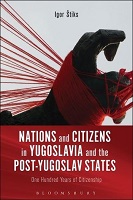Chapter 5 The Bridges Over the Miljacka
The Long Farewell to Yugoslav Citizenship
Author(s)
Štiks, Igor
Collection
European Research Council (ERC)Language
EnglishAbstract
or 'conglomerate' – all occurring in Yugoslavia from mid-1960s at a sometimes vertiginous pace – seem to be interactive parts of the same puzzle. Nevertheless, immediately after the war it appeared that resurrected Yugoslavia and strong patriotism of the national-liberation struggle had given a new impetus to Yugoslavism – this time in a federalist form meant to dissociate the idea from the bitter experiences of pre-war unitarism. Although Yugoslavism itself went through curious re-definitions and had to compete with communist internationalism between 1945 and 1948, socialist nation-building Yugoslavism would be seen and promoted throughout the 1950s as something of uncontested worth. Having described earlier the birth and evolution of Yugoslavism between the mid-nineteenth century and the Second World War, we should recount here its last chapters.
Keywords
nationalism; violence; membership; culture; yugoslav writers; yugoslavism; belonging; disintegration; crisis; identity; nationalism; violence; membership; culture; yugoslav writers; yugoslavism; belonging; disintegration; crisis; identity; Ethnic nationalism; Josip Broz Tito; Kingdom of Yugoslavia; Serbs; Socialist Federal Republic of Yugoslavia; South SlavsDOI
10.5040/9781474221559.ch-006OCN
1030817681Publisher
Bloomsbury AcademicPublisher website
https://www.bloomsbury.com/academic/Publication date and place
London, 2015Grantor
Classification
Society and Social Sciences
Politics and government


 Download
Download Web Shop
Web Shop